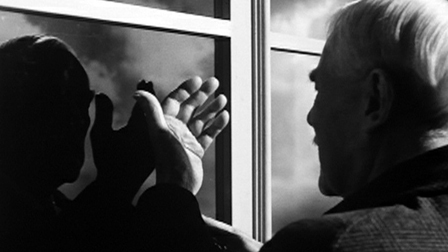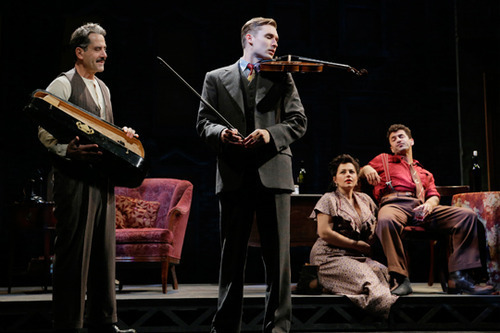Terry Teachout's Blog, page 114
December 10, 2012
TT: Premium leads
* * *
David Mamet has two shows running on Broadway this week. One of them, "The Anarchist," is a freshly minted flop that will close on Sunday. The other, "Glengarry Glen Ross," is a hugely successful revival of one of Mr. Mamet's most popular plays. The situation recalls his own zero-sum philosophy: "Economic life in America is a lottery. Everyone's got an equal chance, but only one guy is going to get to the top....So one can only succeed at the cost of the failure of another." The catch is that Mr. Mamet is now playing the parts of both guys. And unlike "The Anarchist," a wan, stillborn debate about terrorism that stubbornly insists on its meaning in every line, "Glengarry Glen Ross" is one of the finest American plays of the 20th century, a modern classic which--like all the best art--makes its points without seeming to make them.
 You might well wonder whether a play that's already been mounted twice on Broadway, in 1984 and 2005, is due for another revival. But once you've seen this version, performed with stupendous dynamism by a cast led by Al Pacino and Bobby Cannavale, you'll wonder why you wondered....
You might well wonder whether a play that's already been mounted twice on Broadway, in 1984 and 2005, is due for another revival. But once you've seen this version, performed with stupendous dynamism by a cast led by Al Pacino and Bobby Cannavale, you'll wonder why you wondered....If you know "Glengarry," you'll most likely have guessed that Messrs. Cannavale and Pacino are playing Ricky Roma and Shelly "The Machine" Levene, a pair of ravenously hungry Chicago real-estate salesmen who are respectively on the way up and on the way down. "A man's his job," Ricky assures us with adamantine certainty. In the all-male world of "Glengarry Glen Ross," a man's job is also the taproot of his masculinity, and if he can't close the deal, he's no man at all. Ricky accepts that premise as confidently as he rejects the "middle-class morality" that he dismisses with annihilating contempt: "I do those things which seem correct to me today....Bad people go to hell? I don't think so. If you think that, act that way. A hell exists on earth? Yes. I won't live in it." Except that he does....
Mr. Pacino, who was cast as Ricky in the 1992 film version of "Glengarry," has switched to Shelly this time around, and that's the key to his performance: He plays Shelly as if he were Ricky gone to seed, pretending to a success that is no longer his. No sooner are his desperate lies brought to light than he dies inside, seeming to shrink by a foot before your horrified eyes. As for Mr. Cannavale, he couldn't be more different from Liev Schreiber, who played Ricky on Broadway in 2005. While Mr. Schreiber was chilly and sleek, Mr. Cannavale brings a hypnotically vulgar charm to the part. Few stage actors are gifted enough to go head to head with Mr. Pacino and remain standing, but Mr. Cannavale has a double dose of what it takes. To see them spitting lines at one another like snakes on a bed of hot coals is the stuff that sold-out houses are made of....
* * *
Read the whole thing here .
An excerpt from the 1992 film version of Glengarry Glen Ross, with Al Pacino as Ricky Roma:
TT: Lookback
 From 2003:
From 2003:When I was young, Wild Strawberries struck me as exactly what old age must be like. (Had it been a novel, I would have scribbled neatly in the margin of the last page, "This is true.") Now that I'm middle-aged--and eight years older than Bergman was when he made it--I know better. It's far too benign, albeit gorgeously so. It reminds me of what an old music critic once said to me about Der Rosenkavalier: "It's by a young man pretending to be an old man remembering his youth."...
Read the whole thing here .
TT: Snapshot
 From 2003:
From 2003:When I was young, Wild Strawberries struck me as exactly what old age must be like. (Had it been a novel, I would have scribbled neatly in the margin of the last page, "This is true.") Now that I'm middle-aged--and eight years older than Bergman was when he made it--I know better. It's far too benign, albeit gorgeously so. It reminds me of what an old music critic once said to me about Der Rosenkavalier: "It's by a young man pretending to be an old man remembering his youth."...
Read the whole thing here .
TT: Almanac
H.W. Fowler, A Dictionary of Modern English Usage (courtesy of Richard Zuelch)
December 9, 2012
TT: Just because
(This is the latest in a series of arts-related videos that appear in this space each Monday and Wednesday.)
TT: Almanac
Jack Valenti (quoted in Burton Paretti, The Leading Man: Hollywood and the Presidential Image)
December 6, 2012
TT: An American master returns to Broadway
* * *
Clifford Odets didn't make it easy on posterity. Born in 1906, he'd already written two major plays by the age of 31, and turned up on the cover of Time a year after that. Then Hollywood got its claws into him, and he spent the rest of his life knocking out good, bad and indifferent screenplays for money, trying vainly to repeat the successes of "Awake and Sing!" and "Golden Boy" when not preoccupied with studio hackwork. In time his theatrical reputation faded to black, and first-class revivals of his youthful masterpieces are now degradingly rare. Except for a 1964 musical version that starred Sammy Davis, Jr., that "Golden Boy" hasn't been seen on Broadway since 1952. Now Lincoln Center Theater has brought it back to the Belasco Theater, where the play was first performed 75 years ago, and given it a production of the utmost splendor and compulsion. Watching it is like standing in front of a blowtorch.
 Time was when everybody knew the plot of "Golden Boy," in part because it was later turned into the film that made 21-year-old William Holden a star. In the 1939 screen version, Holden was cast in the central role of Joe Bonaparte (now played onstage by Seth Numrich), a talented young Italian-American violinist who hates the emasculating poverty into which he was born and seeks to escape it by becoming a lightweight boxer, thereby horrifying his music-loving father (Tony Shalhoub). Joe inevitably falls among thieves, the worst of whom is a murderous gangster (Anthony Crivello) who uses the boy's hunger for fame to set him on a path that leads away from the "truthful success" for which his father longs.
Time was when everybody knew the plot of "Golden Boy," in part because it was later turned into the film that made 21-year-old William Holden a star. In the 1939 screen version, Holden was cast in the central role of Joe Bonaparte (now played onstage by Seth Numrich), a talented young Italian-American violinist who hates the emasculating poverty into which he was born and seeks to escape it by becoming a lightweight boxer, thereby horrifying his music-loving father (Tony Shalhoub). Joe inevitably falls among thieves, the worst of whom is a murderous gangster (Anthony Crivello) who uses the boy's hunger for fame to set him on a path that leads away from the "truthful success" for which his father longs.Why did it take so long for "Golden Boy" to be revived? The obvious reason is that it has 19 speaking roles and requires five sets, making it impossible to produce commercially other than at ruinous expense. Beyond that, the cornball plot, if taken at face value, is the stuff of parody. But if you instead approach "Golden Boy" as you would an opera, you'll find that Odets knew exactly what he was doing. "Golden Boy" is a true and telling parable of American ambition, a tale in which the ordinary is made extraordinary by transposing it into an emotional key so high that you almost expect the actors to break into song....
"The Anarchist," David Mamet's new play, is a 70-minute-long debate between a hard-left domestic terrorist (Patti LuPone) who has spent 35 years in prison for murdering two policemen and her Grand Inquisitress, the parole officer (Debra Winger) who is resolved to keep her there until she breathes her last. On paper it's an intellectual skirmish about the nature of political fanaticism, written in a stilted style (no four-letter words, a minimum of contractions) that sounds deliberately artificial...
While the issues at stake are sufficiently dramatic in and of themselves to make for an interesting night at the theater, Mr. Mamet, who is on record as believing that "the director is not primary in the theater" and "could, indeed, be disposed of," has made the suicidal decision to direct "The Anarchist" himself. The flat, bald results suggest a Socratic dialogue staged in the just-the-facts-ma'am manner of an episode of "Dragnet," only without closeups....
* * *
Read the whole thing here .
The 1939 film version of Golden Boy, starring William Holden, Adolphe Menjou, and Barbara Stanwyck and directed by Rouben Mamoulian:
TT: When a miss is as good as a mile
* * *
Donald Francis Tovey, the celebrated English musicologist, liked to pose this riddle to his students: "Q. What is it which we all wish to learn from the Great Masters, and why can we never learn it? A. How to get out of a hole. Because they never get into a hole." I thought of his puckish words when I saw the current Off-Broadway revival of August Wilson's "The Piano Lesson." Mr. Wilson was one of the greatest playwrights of the 20th century, and "The Piano Lesson" is one of his best plays--even though it's needlessly talky. Like so much of his work, it's flawed by the garrulousness that was Mr. Wilson's cardinal artistic sin. Yet that didn't stop me from marveling at "The Piano Lesson," nor does it diminish his stature. Even among the great masters, it is imperfection, not perfection, that is the normal condition of art, and the higher you aim, the more likely you are to miss....
 This difficulty is more common to large-scale narrative art than to, say, painting or poetry. The smaller the canvas, the easier it is to get everything right, as Chardin did in "Glass of Water and Coffeepot," which hangs in Pittsburgh's Carnegie Museum of Art. Who would dare to suggest that the artist should have altered a single brush stroke of this exquisitely wrought still life, or long to change so much as one of the 62 lapidary words of William Butler Yeats' "The Choice"?...
This difficulty is more common to large-scale narrative art than to, say, painting or poetry. The smaller the canvas, the easier it is to get everything right, as Chardin did in "Glass of Water and Coffeepot," which hangs in Pittsburgh's Carnegie Museum of Art. Who would dare to suggest that the artist should have altered a single brush stroke of this exquisitely wrought still life, or long to change so much as one of the 62 lapidary words of William Butler Yeats' "The Choice"?...As the scale of a work of art increases, though, the artist's control of detail diminishes, and that's when things typically start to go wrong. I don't know a better Western than Howard Hawks' "Rio Bravo," but I wouldn't have the slightest difficulty chopping out at least 15 of its 141 minutes...
Joan Acocella recently wrote a piece for the New Yorker in which she cited several great novels with defective endings, the best known of which are "David Copperfield" and "Huckleberry Finn." What I call "finale-itis," however, is just as common in other lines of artistic endeavor. Duke Ellington had so chronic a case of finale-itis that he actually persuaded Billy Strayhorn, his longtime collaborator, to write the last 10 measures of "A Tone Parallel to Harlem." (No, you can't tell who wrote what unless you've been tipped off in advance.) And William Walton stalled out completely when writing his First Symphony, allowing it to be "premiered" in 1934 without a final movement, which he belatedly supplied a year later. "I had to wait for the mood--I could not think of the right thing to do," he said. "Then it came." Except that it didn't: The finale of Walton's First is a super-spectacular but windy piece of musical rhetoric that lacks the concentration of the preceding movements.
Here as elsewhere, the good news is that the imperfections of a masterpiece need not prevent us from loving it, flaws and all....
* * *
Read the whole thing here .
Semyon Bychkov and the WDR-Sinfonieorchester Köln perform the finale of William Walton's First Symphony in concert in 2009:
TT: Almanac
Holbrook Jackson, The Anatomy of Bibliomania (courtesy of Richard Zuelch)
December 5, 2012
TT: So you want to see a show?
Here's my list of recommended Broadway, off-Broadway, and out-of-town shows, updated weekly. In all cases, I gave these shows favorable reviews (if sometimes qualifiedly so) in The Wall Street Journal when they opened. For more information, click on the title.
BROADWAY:
• Annie (musical, G, reviewed here)
• Bring It On (musical, G, closes Dec. 30, reviewed here)
• A Christmas Story (musical, G, closes Dec. 30, most performances sold out last week, reviewed here)
• Dead Accounts (serious comedy, PG-13, closes Feb. 24, most performances sold out last week, reviewed here)
• Evita (musical, PG-13, reviewed here)
• The Mystery of Edwin Drood (musical, PG-13, most performances sold out last week, extended through Mar. 10, reviewed here)
• Once (musical, G/PG-13, nearly all performances sold out last week, reviewed here)
• Who's Afraid of Virginia Woolf? (drama, PG-13/R, reviewed here)
OFF BROADWAY:
• Avenue Q (musical, R, adult subject matter and one show-stopping scene of puppet-on-puppet sex, reviewed here)
• The Fantasticks (musical, G, suitable for children capable of enjoying a love story, reviewed here)
• The Piano Lesson (drama, PG-13, closes Dec. 30, reviewed here)
• Tribes (drama, PG-13, closes Jan. 6, reviewed here)
• Vanya and Sonia and Masha and Spike (comedy, PG-13, closes Jan. 13, reviewed here)
CLOSING NEXT WEEK OFF BROADWAY:
• Giant (musical, G/PG-13, closes Dec. 16, reviewed here)
Terry Teachout's Blog
- Terry Teachout's profile
- 45 followers



